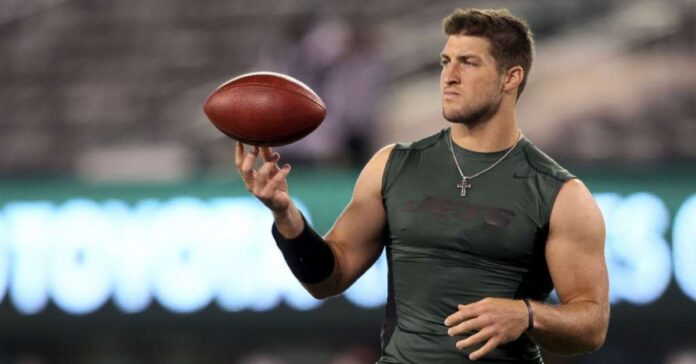Despite Tim Tebow’s success in college, he struggled to make it in the NFL, where the game was faster and more complex.
Tim Tebow was an outstanding quarterback in college, playing for one of the greatest college teams ever.
Highlights
- Tim Tebow’s passing skills caused the ball to lose speed, float in the air, and often come out high, making it easier for defenders to read and intercept.
- College defenses could break down quickly with just one player making a mistake, but NFL defenses went much faster and stronger for Tebow.
- He was eventually traded to the New York Jets, marking the end of his stint with the Broncos.
He won the Heisman Trophy and led the Florida Gaters to championships.
But things didn’t go as well when he jumped to the NFL.
Even though many players, like Brock Purdy, have been able to jump from college to the NFL and succeed, Tebow couldn’t adjust his game enough to meet the NFL’s high standards.
1. Tebow’s Passing Skills Wasn’t Efficient For NFL
Tim Tebow didn’t have the passing skills typically required for an NFL quarterback.
His delivery was slow and long, a habit he had developed over the years, making it difficult to adjust.
NFL quarterbacks typically have fast, efficient throwing motions. They keep the ball close to their ear and release it quickly.
Conversely, Tebow would bring the ball back like throwing a javelin, too far from his body and down low.
This caused the ball to lose speed, float in the air, and often come out high, making it easier for defenders to read and intercept.
While he had the potential to develop those skills, he entered the league without them.
He managed to win a few games because of his unpredictability, ability to run the ball, and a strong Denver Broncos defense.
Still, ultimately, the team didn’t believe his style of play would be sustainable long-term.
2. Tebow Juggled The Big Gap Between College Football And NFL
Tim Tebow’s biggest strength in college was his size, which made him a constant running threat.
He used this to dominate defenses that weren’t as disciplined as those in the NFL.
College defenses could break down quickly with just one player making a mistake, but NFL defenses are much faster and stronger.
No matter how good a quarterback is at running, NFL defenders are skilled enough to stop them, whether catching up to someone like Michael Vick or tackling players like Cam Newton or Steve McNair.
Tebow’s running ability didn’t scare NFL defenses, especially since his passing was so weak.
Despite his college success, his passing accuracy was often poor. He would frequently overthrow or underthrow open receivers, making them adjust to catch the ball.
Even backup quarterbacks in the NFL generally pass the ball better than Tebow did.
3. When Tebow Couldn’t Gain The Trust Of Operations Manager John Elway
After a successful second season in Denver, where he led the Broncos to the playoffs, Tim Tebow and everyone else assumed he would be the starting quarterback the following year.
However, after a loss to the Patriots, trade rumors started to swirl.
Despite his success, the potential opportunity to bring in Peyton Manning as a free agent and ongoing criticism of Tebow’s quarterbacking skills fueled speculation that he might be traded.
The team’s player operations manager, John Elway, attempted to calm the rumors by stating that Tebow would be the quarterback.
However, it was clear that Elway wasn’t entirely convinced.
Once Peyton Manning became available, it was clear Tebow’s time in Denver was over.
Tebow was eventually traded to the New York Jets, marking the end of his stint with the Broncos.
At that point, it seemed Tim Tebow’s NFL career had ended, and he needed to look for new opportunities.
He joined ESPN as a college football analyst and then pursued a career in minor-league baseball. However, he announced retirement in 2021.
Additional Information
- Tim Tebow was born in the Philippines to American parents Pamela Elaine and Robert Ramsey Tebow II.
- His parents met while attending the University of Florida in the late 1960s, married in 1971, and later moved to the Philippines in 1985 to serve as Baptist missionaries.
- Tim began his high school football career as a tight end at Trinity Christian Academy in Jacksonville. Still, he later moved to a different area and became eligible to play quarterback at Allen D. Nease High School.



